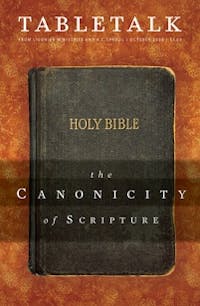
Request your free, three-month trial to Tabletalk magazine. You’ll receive the print issue monthly and gain immediate digital access to decades of archives. This trial is risk-free. No credit card required.
Try Tabletalk NowAlready receive Tabletalk magazine every month?
Verify your email address to gain unlimited access.
The apostles who associated with the Lord during His earthly ministry were still dependent upon the Holy Spirit to lead them into all truth. That truth has been transmitted to us in the pages of Scripture. Thus, Peter wrote: “And we have something more sure, the prophetic word, to which you will do well to pay attention as to a lamp shining in a dark place, until the day dawns and the morning star rises in your hearts” (2 Peter 1:19). In the twilight of the apostolic age, the church was being taught her dependence on the written Word of God. So Paul exhorted Timothy “to continue in the things that he had learned.” Timothy had been taught by Paul himself, but now in the face of “times of difficulty” no new source of revelation was to be expected. Timothy has to turn to “the sacred writings.” Through these “the man of God may be competent, equipped for every good work” (2 Tim. 3:14–17). He must be edified, but he was also called to “preach the word; be ready in season and out of season; reprove, rebuke, and exhort, with complete patience and teaching.” No easy task, “for the time is coming when people will not endure sound teaching, but having itching ears they will accumulate for themselves teachers to suit their own passions, and will turn away from listening to the truth and wander off into myths” (2 Tim. 4:2–4). This relevant warning is pertinent when evangelical churches demand drama and entertainment, and where pulpits are shifted or even destroyed to make room for the band.
Church history demonstrates a connection between faithful preaching under the blessing of the Spirit of God and love for Scripture. It is a reciprocal action. Where the Bible is loved, true preaching is prized and produces congregations of men and women eager to search the Scriptures for themselves. The Reformation provides superb examples of this process. Some historians have supposed that the English Reformation was driven merely by the political and personal ambitions of monarchs and their courtiers. Nothing could be further from the truth. From the late fourteenth century there had been a long tradition of secret study of illegally-produced English Bibles. When Tyndale’s printed New Testaments were smuggled into the country in the 1520s, they were eagerly received and circulated in the face of bitter opposition. Thus, before the political tide turned, there were already eager students of the Word among the merchants and even artisans. Reaction and persecution in Mary Tudor’s short reign revealed that hundreds of Englishmen were prepared to die rather than deny the Gospel received from the English Bible. Some fled to other countries to worship according to their consciences and pray for the deliverance of their own land.
From the refugees in Geneva came one of the finest products of the Reformation — the Geneva Bible. This work began when many English men and women were dying in the flames for the sake of the Gospel with little hope of an immediate change. But in the providence of God, when this magnificent version came off the presses, the Protestant Elizabeth had succeeded to the throne with the hope of better days to come. The Genevan translators presented their work to their fellow-countrymen with these words: “We beseech you that this rich pearl and inestimable treasure may not be offered in vain, but as sent from God to the people of God, for the increase of his kingdom, the comfort of his Church, and discharge of our conscience, whom it hath pleased him to raise up for this purpose, so you would willingly receive the Word of God, earnestly study it and in all your life practice it.”
This was no vain hope, for within a generation a spiritually deprived people had become the most Protestant nation in Europe. Returning exiles were called to English pulpits, bringing their new Bible with them. Zealous Protestants were appointed to strategic positions in the universities. Within a generation England had become a land of the Bible. She was blessed with teachers who took seriously the exhortation of the apostle: “Devote yourself to the public reading of Scripture, to exhortation, to teaching. …Persist in this, for by so doing you will save both yourself and your hearers” (1 Tim. 4:13–16).
Times of spiritual decline have followed, but whenever the work of God has been revived there has been an eagerness for the Word of God. Today there is a plethora of Bible versions available in the English language. Our fathers would be amazed by the number of study resources that are available. Evangelical Christians by definition acknowledge the authority of the Scriptures, but in the Western world hunger for the Word of God is not widespread. Doctrine is dismissed as a luxury not necessary for the man in the pew nor indeed for the man who is anxious to win souls. Public prayers and the weakness of the church in the face of the challenges of humanism, atheism, and non-Christian religions indicate a flickering spirituality. These are dangerous signals. If the candlestick is not to be removed, let us repent and seek a renewed love for what the Genevan men called “this rich pearl and inestimable treasure.” Such a repentance may lead not only to a better understanding, but also lay a foundation for a more widespread and deeper work of God.
